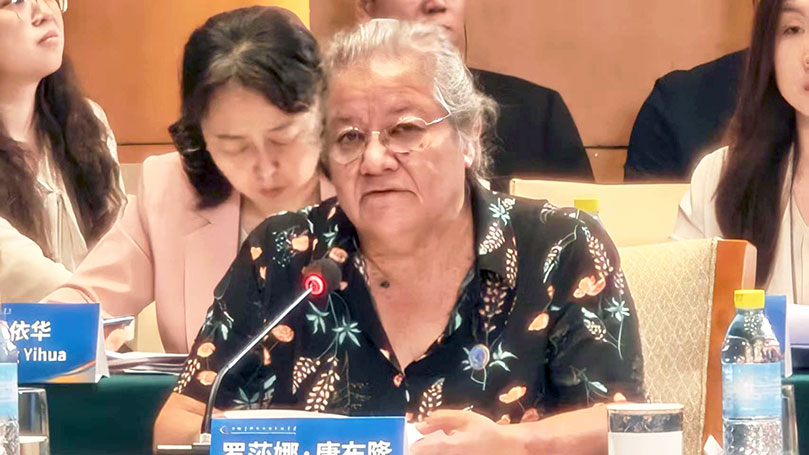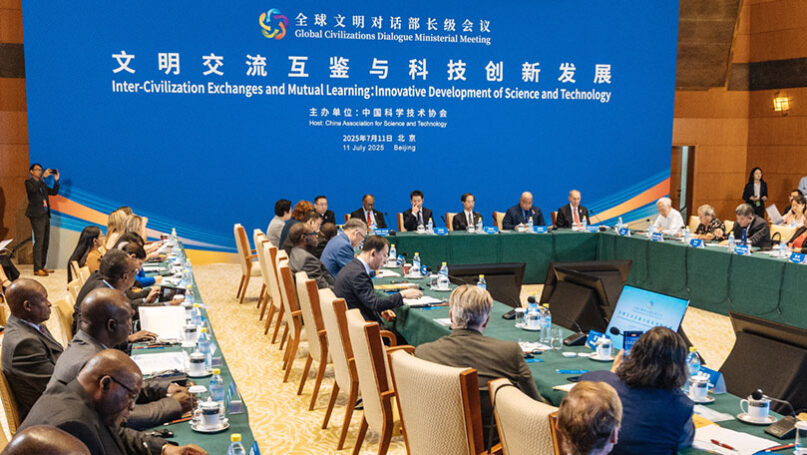
The following was presented by CPUSA co-chair Rossana Cambron at the Global Civilization Dialog Ministerial Meeting during the Parallel Forum on Inter-Civilization Exchanges and Mutual Learning: Innovative Development of Science and Technology.
Greetings to all. Thank you for the opportunity to learn from the collective wisdom of this forum. While my technical understanding of AI is limited, I want to share one thought that comes to mind. I recognize both the fears and hopes it inspires. AI’s impact — whether positive or negative — is not inherent to the technology itself but determined by those who wield it and the systems that guide its use.
Profit vs. people: The deciding factor
Will AI accelerate life-saving medical diagnoses, or will it be manipulated to prolong illnesses for pharmaceutical profit? The answer depends on a nation’s economic priorities. Under capitalism, AI risks becoming a tool for exploitation, prioritizing corporate gains over public good. In contrast, socialist systems could harness AI for collective benefit — improving education, healthcare, and equity — if guided by humanistic principles.
Dispelling fear, embracing agency
We’re told to fear AI as an autonomous force, but this narrative obscures the real issue: who controls it? Like past innovations — computers or social media, for example — AI is a mirror of human intent. Its dangers stem from unchecked capitalism, not the technology itself.
For instance:
- In the area of education, AI could offset austerity-driven cuts by offering personalized learning, as seen in China’s classrooms. Yet in profit-driven systems, it may deepen inequities. A better-informed working class is less likely to fall prey to propaganda that does not represent its interest. The ability of AI to create personalized learning is essential in capitalist countries, where education is not a valued investment, but the population needs to be educated enough to see who is not representing their best interest.
- In the field of healthcare: I am reminded of how useful it would have been for my brother-in-law, who was first diagnosed with bronchitis, then pneumonia, and finally cancer, when it was too late to save him. AI could prevent such tragedies by scanning medical images with exceptional accuracy — but only if prioritized over hospital profits.
- The predictive analytics that AI has can allow governments to track disease outbreaks and develop preventive strategies. It can also be used in disaster management to predict natural calamities, enabling faster and more effective response times. I have wondered how this would have prevented the over 100 people who are currently missing from the recent flood in the state of Texas.
- We have witnessed how AI-powered robots can be deployed to navigate and conduct search-and-rescue operations that are too dangerous for humans.
- Job displacement is inevitable under capitalism, where automation serves shareholders. Under capitalism, there is no retraining or sustainable provisions when a worker loses their job to AI. I personally refuse to use self-check-out machines in my country, because I know they will eliminate jobs.
- Socialist models could retrain workers without sacrificing livelihoods as their priority is people before profits.

Resistance and responsibility
The European Union’s ethics guidelines (lawful, ethical, robust AI) are a start, but bias persists when algorithms reflect corporate interests.
To counter this:
- Worker-led oversight is key. Unions and scientists must shape AI’s development, ensuring it serves communities, not elites.
- AI also opens new pathways for entrepreneurship by providing tools for small businesses to compete with larger corporations.
- Global solidarity is essential. As the AFL-CIO warns, fascism thrives when technology empowers the few. Our movements — from protests to strikes — must demand democratic control of AI.
- Cross-border collaboration requires that progressive nations must share AI advances to counter capitalist exploitation, as seen in China’s public-sector innovations. Its participation in contributing to AI is essential to ensuring that accurate information is used to drive the algorithm.
AI as evolution, not revolution
While artificial intelligence offers immense potential for social impact, it also introduces certain risks that need to be managed carefully. Ensuring that AI is used responsibly requires a focus on mitigating unintended consequences, such as algorithmic bias, privacy concerns, and the potential for exacerbating inequality.
Also, AI can be used to spread wrong information that can cause chaos and manipulate thinking, resulting in working people supporting something that is against their own interest.
This requires organizations to prioritize fairness in their AI systems by developing algorithms that account for diverse populations and by continuously auditing models to detect and address biases. We are counting on socialist-minded countries and their scientists to ensure this development.
It should also be able to develop critical thinking which is essential in forming objective conclusions of a given situation.
Under socialism, AI could uplift humanity; under capitalism, it entrenches inequality.
Tools have always driven human progress — from plows to washing machines. AI is no different. The question isn’t whether to embrace it, but how. Under socialism, AI could uplift humanity; under capitalism, it entrenches inequality.
As we can see more clearly each day, AI and society are now intertwined. Our task is clear: unite workers, scientists, and activists to ensure this tool becomes a force for liberation — not another weapon for the ruling class. The future isn’t about machines “taking over.” It’s about “who” takes over AI.
Image: Participants of the Parallel Forum on Inter-Civilization Exchanges and Mutual Learning discuss Innovative Development of Science and Technology at the Global Civilization Dialog Ministerial Meeting (Global Times)


 Join Now
Join Now